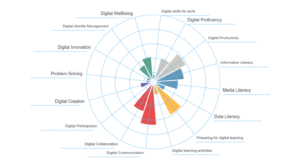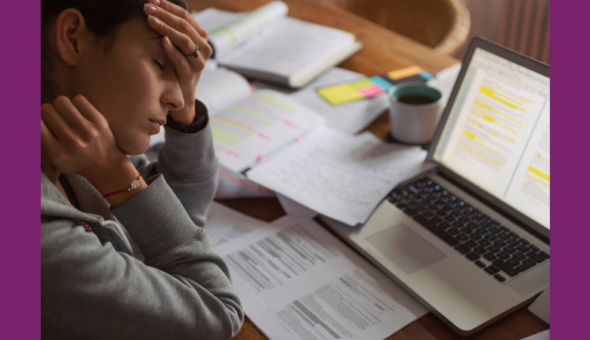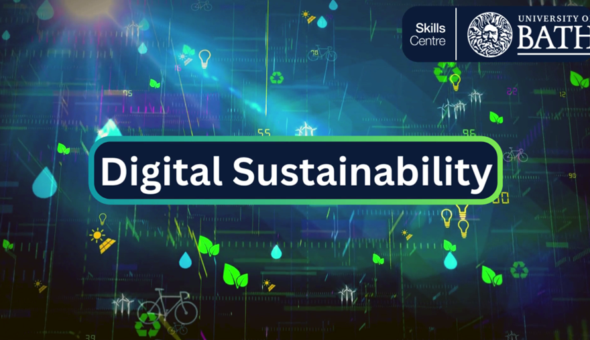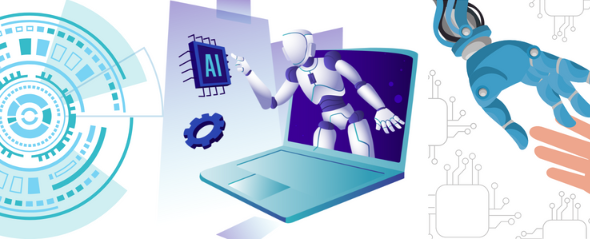Skills Co-Creator Asha Dey explains how the Jisc self-assessment tool helped her reflect on and develop her digital skills.
Having grown up with technology as part of our lives, it’s easy to believe that our generation has all the digital skills we need for both our courses at University and future employment.
However, understanding what the key digital skills are and how to improve our confidence and proficiency in applying them, is vital – especially in a post-covid world.
My digital skillset
I’m a first year Psychology student and found it quite daunting to complete my first year completely online!
It really highlighted the importance of being able to navigate Teams, Zoom and SPSS as well as gain confidence in other types of online communication such as forum debates, that I hadn’t engaged with before.
To figure out what digital skills I needed to develop, I completed the JISC self-assessment tool which was a quick, ten-minute survey. I was provided with a personalised report that looked like this:
I didn’t think there could be so many components to digital skills and was surprised that there was room for development in many of them!
The University uses a national framework from JISC to define digital skills in six key areas.
Admittedly, I found lots of the terminology surrounding these confusing.
I’ll try to explain what the six key categories of digital skills mean to help you figure out where your strengths and weaknesses might lie.
1. Information and Communication Technology (ICT)
This refers to your ability to use different devices, software and apps so things like Zoom and Teams as well as phones and laptops and your ability to use new applications.
The next steps section of my JISC report suggested adopting a new application to boost my proficiency in this area. After reflection, I decided to learn how to use OneNote to try and organise all my notes from the year, which I’ve found to be a useful tool!
2. Information, data and media literacies
This refers to our ability to source, evaluate, manage and share information online – particularly important skills for degree level writing!
The personalised report recommended a FutureLearn course called “Learning Online: Researching your Project” which I’ve been working through self-paced. It’s helped me evaluate and consider where information online has come from. I've learnt that the University has access to 'FutureLearn Campus' which gives us upgraded access to many free, flexible online courses.
3. Digital creation, problem-solving and innovation
This capability is all about your know-how in producing online materials. This can include presentations, podcasts, and creating images.
Problem solving and using data is a skill that I clearly need to develop (very small bar on the report!). MySkills has lots of resources on getting started with data analysis as well as a range of videos from MASH (Maths and Resources Centre). The guide on using SPSS made me much more confident about attempting lab reports.
4. Digital communication, collaboration, and participation
This refers to the way that you engage and interact with other people online. This can range from simply email communication, to working on a shared document on Teams for a group project all the way to online forum discussions.
From my own experience, I know digital participation is something I and many other students struggle with. For more first-hand experience of how to improve this capability, head to this blog.
5. Digital learning and development
This is about how we participate in online activities in ways that help ourselves, and others. For example, using online quizzes, tutorials, and podcasts to further your learning as well as using tools to help with your organisation and time management like task lists, calendars, or shared calendars.
Whilst I thought I was pretty good at this, spending time trying out different resources like Notion to make lists and prioritise deadlines, has really helped me stay on top of things!
6. Digital identity and wellbeing
Digital identity refers to carefully managing your personal online presence on platforms like Instagram, Twitter and Snapchat as well as your professional presence on LinkedIn (there's more on setting up a LinkedIn profile in this blog).
‘Digital wellbeing’ may sound a bit more ambiguous – this refers to understanding when to take a break from technology and have a healthy relationship with our devices.
Next steps
Overall, I’ve found assessing my digital capabilities very useful both for my academic and future professional life. I plan to continue to assess my digital capabilities again next year to measure improvement and identify what I need to continue working on.
You can continue to access the JISC self-assessment tool until the end of July.
Using the Digital Capabilities Resources on MySkills with targeted videos and resources for each of the digital skills has helped me develop these and is a great way for you to start building the digital capabilities you need!
The Skills Centre would love to hear your experiences of using the self-assessment tool and how you’re using it to develop your digital skills. Please leave us your comments below.
Respond




